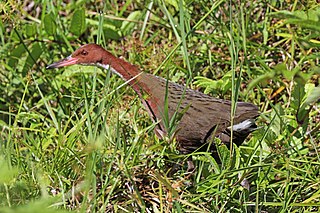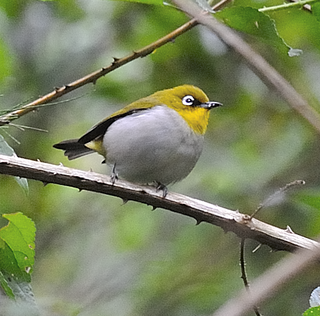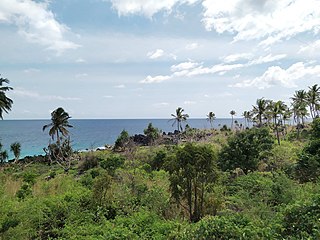
The Marianne white-eye, also known as Seychelles chestnut-sided white-eye or Seychelles yellow white-eye, is an extinct species of small bird in the white-eye family.

The Seychelles white-eye is a rare warbler-like perching bird from the family of white-eyes (Zosteropidae). It is endemic to the Seychelles. At one time thought to be extinct, it was rediscovered and is now listed as Vulnerable by the IUCN.

The Mayotte scops owl is a species of owl in the family Strigidae. It is endemic to the island of Mayotte in the Comoros.

The white-throated rail or Cuvier's rail, is a species of bird in the family Rallidae.
The Buru white-eye is a species of bird in the family Zosteropidae. It is endemic to Indonesian islands, including the island of Buru which gives its name. Its natural habitats are subtropical or tropical moist lowland forests and subtropical or tropical moist montane forests. The species occupy an area of larger than 20,000 km2 and is thought to have a stable population of above 10,000, and thus are not considered as threatened.

The lemon-bellied white-eye is a species of bird in the family Zosteropidae. It is endemic to Indonesia, where it occurs on a number of islands from the Sunda Strait to the Aru Islands. It is present on several of the Lesser Sunda Islands as well as on parts of Sulawesi, as well as many smaller islands, but is absent from the larger islands of Borneo, Java, Sumatra and Timor. Currently, HBW describes five sub-species of lemon-bellied white-eye. However, the extensive distribution of Z. c. intermedius is likely to contain more than one reproductively isolated population (cf. Z.c. intermedius and Z. c. flavissimus, with the latter now considered a distinct species, the Wakatobi white-eye.

The ashy-bellied white-eye is a species of bird in the family Zosteropidae found in the Lesser Sunda Islands in the Indonesian Archipelago and northern Cape York Peninsula in Queensland, Australia. It is sometimes called the pale white-eye or pale-bellied white-eye, but should not be confused with the pale-bellied white-eye.

The pale-bellied white-eye is a species of bird in the family Zosteropidae. It is endemic to SE Sulawesi in Indonesia. Its natural habitat is subtropical or tropical moist lowland forest. The species has a limited distribution and also appears to be sensitive to human disturbance.

The capped white-eye is a species of bird in the family Zosteropidae. It is found in New Guinea. Its natural habitat is in subtropical or tropical moist montane forests. It has a white eye ring, round wings, and strong legs. The capped white-eyes are sociable and live in large flocks. The Oya Tabu white-eye of the D'Entrecasteaux Islands was formerly considered a subspecies, but is now thought to be a distinct species.

The Kai Besar white-eye, also known as the pearl-bellied white-eye, is a species of bird in the family Zosteropidae. It is native to the Kai Islands in Indonesia.

The Malagasy white-eye is a species of bird in the white-eye family, Zosteropidae. Found in Madagascar and Seychelles, its natural habitats are subtropical or tropical dry forests, subtropical or tropical moist lowland forests, subtropical or tropical mangrove forests, and subtropical or tropical moist montane forests.

The Papuan white-eye, sometimes known as the New Guinea white-eye, is a species of bird in the family Zosteropidae. It is found in the Aru Islands and New Guinea. Its natural habitats are subtropical or tropical moist lowland forests and subtropical or tropical moist montane forests. The species was first classified in 1878, and has a conservation status of Least Concern.
The Samoan white-eye is a species of bird in the family Zosteropidae. It is endemic to the island of Savai'i in Samoa.

The Kai Kecil white-eye, also known as the golden-bellied white-eye, is a species of bird in the family Zosteropidae. It is native to the Kai Islands in Indonesia.
The Pemba white-eye is a species of bird in the family Zosteropidae. It is endemic to Tanzania.
The Vella Lavella white-eye, belted white-eye, or banded white-eye is a species of bird in the family Zosteropidae. It is endemic to the Solomon Islands.

The Comoros forests is a terrestrial ecoregion which covers the Comoro Islands, which lie in the Mozambique Channel between Madagascar and East Africa. These include four main islands: Grande Comore, Anjouan and Mohéli, of the Union of the Comoros, and Mayotte, a department and region of France.

The Anjouan white-eye is a species of bird in the family Zosteropidae.
The Oya Tabu white-eye is a species of bird in the family Zosteropidae. It is native to the Fergusson and Goodenough islands. Its natural habitat is in subtropical or tropical moist montane forests. The Oya Tabu white-eye was formerly considered a subspecies of the capped white-eye.

The Forests of Mayotte National Nature Reserve is a protected area on Mayotte, an island overseas department of France in the Indian Ocean.

















